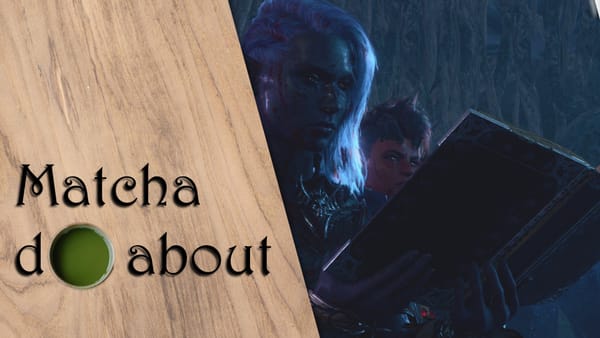The Underworld and its Queen
This is an article about Persephone and the depictions of her story and character throughout the ages; From her mythological roots to more contemporary media such as Hades (2020) or Stray Gods (2023).
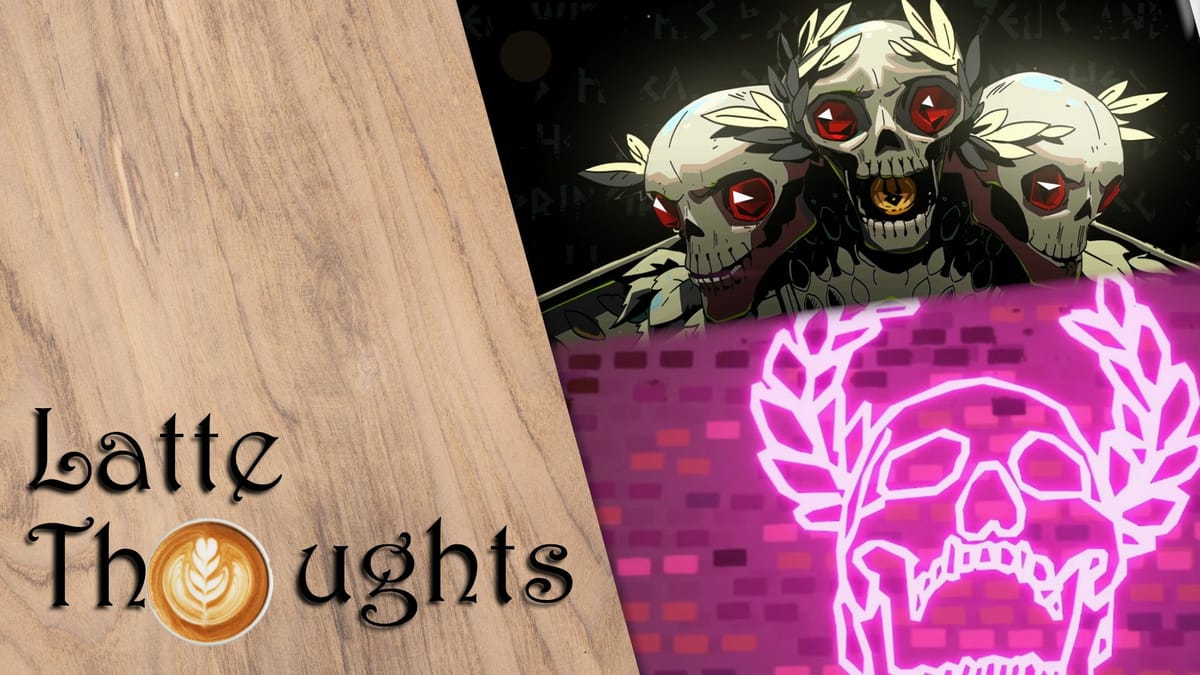
On May 6th, 2024, SuperGiant Games dropped the early access for Hades II on Steam. Yes, the game is already pretty darn amazing, and it certainly is a game I’d recommend. However, instead of truly focusing on playing through the game and mastering its combat mechanics, I've ended up with some stray thoughts about mythology and its gods...
I've always had a fascination with adaptations and these stray thoughts about the adaptation of mythology in contemporary times led me to remember Summerfall Studio's Stray Gods, released in August 2023.
These two games are, in many ways, completely different from one another. While Hades gameplay is more combat focused, Stray Gods plays more like a visual novel - or a visual musical. In Hades, the gameplay loop consists of a series of escape attempts, fighting through the underworld, each death, while still a setback from the original goal of escape; allowing one to adapt, make friends with NPC's, and upgrade one's abilities to ensure progression in the future. Meanwhile, Stray Gods tells its story through the player's choices in a text (or song) based narrative adventure.
Furthermore, while Hades locates their characters in a setting more appropriate to reflect their original myths, Stray Gods places and weaves its characters more directly into modern times. In this piece, I wish to analyse and compare the portrayal of one specific character. A character who manages to bring those games together, while simultaneously splitting them further apart. This is a piece about Persephone.

Greek Mythology, what are our sources?
Early stories relied on orality, thus, even if a common mythos was created, the details might not add up. Now, if a story has been retold and reshaped so many times, how can we decide in which sources to place our trust?
“What is a Greek myth? What are the sources for Greek myths? The answer to the first question is determined wholly or in large part by the answer to the second. [...]” - (Edmunds XV)
The introductory chapter to Lowell Edmunds’ Greek Myth tries to answer this question by analysing the different, more contemporary approaches of analysing the past and its scriptures. Foremost, it is noted that there exists a certain consensus on which scriptures even function as primary sources: the ancient poets and early works of mythography (XV-XVIII).
For this piece, the approach I found most interesting was in reference to Robert Fowler, who noted early on that there is one issue for this aforementioned “definition” of myths; Namely its discrepancies. These do not only appear when comparing two different works, but also within the same source material. Edmunds’ Greek Myth elaborates by referring to Homer’s Iliad, where the “[...] throwing of Hephaestus from Olympus is recounted twice, in different places. Once it is Zeus who throws him (1.590-94) and once it is Hera (18.394-99).” (Edmunds XVIII)
Fowler resolves this by stating that all forms of myths must have been heard, and that they are dependent on the context from which they had been heard originally. The “unity (of the myth), however arbitrarily derived, notionally underlies the inherited multiplicity” (Fowler in Edmunds XVIII). It is then further elaborated that ‘myth’ as it had been reliant on orality “must, in order to be accepted in the first place, conform to the community’s norms [...]” (Edmunds XXIV).
This means that either version is ‘correct’, but that their reach was dependent on context. However, it also implies that the act of Hephaestus being thrown from Olympus is overall more important for the overall myth than the god or goddess behind the act. Thus, it is also important to note the changes that a myth or its retelling will go through as a means to find its skeletal structure; its essence.
Another issue when researching Greek mythology lies in actually deciphering its myths. When looking into the origins of the pantheons, there is an enormous amount of overlap and uncertainty regarding the actual gods in question. The use of titles, or epithets, over any actual names can cause frustration. If the same epithet is used for multiple gods without further clarification, then how can one be certain to whom the myth actually refers to?
“BRIMO (Brimô), the angry or the terrifying, occurs as a surname of several divinities, such as Hecate or Persephone (Apollon. Rhod. iii. 861, 1211; Tzetz. ad Lycoph. 1171), Demeter (Arnob. v. p. 170), and Cybele. (Theodoret. Ther. i. 699.) The Scholiast on Apollonius (l. c.) gives a second derivation of Brimo from Bromos, so that it would refer to the crackling of the fire, as Hecate was conceived bearing a torch.” ("Demeter Titles")
All of this to say: Greek Mythology is complicated and this piece will certainly neither reinvent the wheel, nor try to uncover the secrets behind the many epithets of Persephone. Instead, this piece will focus on the more commonly told tales and hymns that cover the "origins" of Persephone - and how this mythos might have evolved throughout time.
Who even is Persephone?
Reliable, yet ancient, scriptures are the works of Homer, most notably the Iliad and Odyssey, as well as the works of Hesiod such as the Theogony (Nagy). There is no consensus on which text is older, though in lists, Homer will often be found dated slightly earlier (Nagy). This article will look at its sources following this timeline, as Nagy had suggested. A similar dated list was also noted on the website theoi.com, which proved to be a reliable research aid.
In both the Iliad and the Odyssey, Persephone is mentioned, though she already gathered a reputation as "dread Persephone" and is found at Hades side in the underworld (Homer, Iliad, Book 9 / Odyssey, Book 10 - 11). In order to understand why Persephone is stationed at Hades' side, one has to look elsewhere.
Now, the Theogony has the answer at the ready. It is a genealogy of the Greek Pantheon and, thus, it provides a solid basis for this research. Similarly to Homers' work, there are mentions of Hades and Persephone within the underworld. Once again, Persephone's reputation as something to be dreaded is made clear, as the Theogony speaks of the underworld and its occupants itself:
There, in front, stand the echoing halls of the god of the lower-world, strong Hades, and of awful Persephone. A fearful hound guards the house in front, [...] - (Hesiod l. 767 - 770).
However, while covering the Olympian gods, Hesiod focuses on Zeus and his seven wives, where we're finally given more information about the dreaded Persephone's origins:
“Also he [Zeus] came to the bed of all-nourishing Demeter, and she bare white-armed Persephone whom Aidoneus [Hades] carried off from her mother; but wise Zeus gave her to him. (Hesiod l. 912 - 914)
This paragraph covers two major pieces of information: First, it covers her parentage; She is the daughter of Zeus and Demeter. Second, it covers the reason for her presence within the underworld; She had been, at some point, abducted by Hades.
Due to the nature of the Theology, everything is kept short and to the point, thus it can be assumed that this snippet about the abduction of Persephone encapsulates the essence of the story. Thus, these are arguably the four elements that are the core of Persephone's story:
- Persephone had been taken against her will.
- Aidoneus [Hades] was the perpetrator.
- Persephone hadn't just been taken, she had been taken away from her mother.
- Zeus was the one who allowed for this to happen, or even "gave" Persephone to Hades.
Hesiod figuratively tethers Persephone to Demeter not once, but twice. This is partially due to the nature of the Theogony as a genealogy. Persephone's abduction is a side-note while Hesiod elaborates the relationship between Zeus and Demeter. Thus, the first tether that ties Persephone to Demeter is their familiar relation; She is the daughter of Demeter. The second tether shows in regard to the abduction: The fact that Persephone wasn't just removed, but removed from her mother, is an important distinction to make. Especially, since this second tether will only be reinforced and elaborated upon in later scriptures.
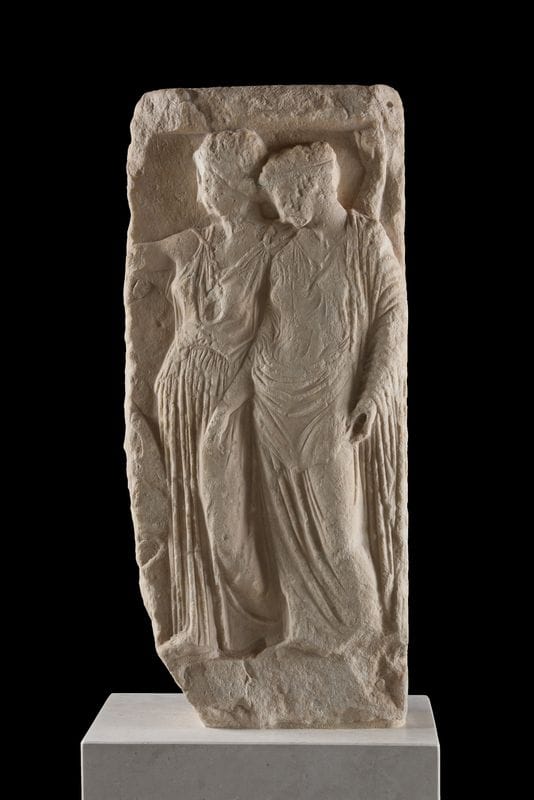
Scriptures, such as the Homeric Hymns, elaborate further on the abduction of Persephone. Once again, this story is only a part within another larger story. This is a story told within the Hymn to Demeter:
“I begin to sing of rich-haired Demeter, awful goddess – of her and her trim-ankled daughter whom Aidoneus [Hades] rapt away, given to him by all-seeing Zeus the loud-thunderer.” ("Homeric Hymns 1 - 3", II. To Demeter l. 1 - 3)
This preamble reiterates the core elements as they've been established in the Theogony. Already in its name it is evident that this myth cares about the figure of Demeter. The fact that we find the story of Persephone within this story further strengthens their previously established ties. This hymn then adds many additional details; First and foremost for this piece, the hymn elaborates on the events that caused the abduction:
The tale of Persephone begins in a meadow. She had been playing with the Nymphs and collecting flowers until she came across a rather specific flower. A flower that had been created by Zeus "to be a snare" ("Homeric Hymns 1 - 3", II. To Demeter l. 5 - 13). The flower captured her attention so well that when she tried to take it, she had been surprised by Hades, who had then taken her away on his chariot. She had been unable to do anything but call for help as she was taken away ("Homeric Hymns 1 - 3", II. To Demeter l. 14 - 21).
While it had always been clear that Zeus had meddled in some ways to "give away" Persephone, the actual abduction had always been done by Hades, while the how behind Zeus meddling had remained a mystery. Through the hymns it is made clear that Zeus ensured that Hades abduction would work, he ensured that Persephone was distracted, ensnared, and, thus, caught unaware at the pinnacle moment.
"And the girl [Persephone] was amazed and reached out with both hands to take the lovely toy; but the wide-pathed earth yawned there in the plain of Nysa, and the lord, Host of Many [Hades], with his immortal horses sprang out upon her [...]" ("Homeric Hymns 1 - 3", II. To Demeter l. 15 - 17)
Throughout the translation of the hymn, Persephone is often referred to as "the girl", or "the daughter". In the original version this would have been the same term, namely the ancient Greek term Κόρη. Κόρη could have been considered an epithet for Persephone, her title, thus simply being girl/daughter at that point in time. However, other versions and translations would even use Kore/Core as the name for Persephone, the latter only being used after her abduction (Brulé 14). It is evident through that referential use of language that Demeter is the focal point. This hymn is meant to cover her story. Thus, what is being told to the reader is not what happened to Persephone, but what happened to the daughter of Demeter while her mother had been absent.
"He [Hades] caught her up reluctant on his golden car and bare her away lamenting. Then she cried out shrilly with her voice, calling upon her father, the Son of Cronos, who is most high and excellent. But no one, either of the deathless gods or of mortal men, heard her voice, [...] only tender-hearted Hecate, bright-coiffed, the daughter of Persaeus, heard the girl from her cave, and the lord Helios [...] So he, that Son of Cronos, of many names, who is Ruler of Many and Host of Many, was bearing her away by leave of Zeus on his immortal chariot – his own brother's child and all unwilling." ("Homeric Hymns 1 - 3", II. To Demeter l. 19 - 27)
The moment of the abduction adds a few more details that had previously been unknown, namely that: Persephone had tried calling for her father's aid, but had been ignored, and that there had been two characters who had at least partially witnessed this event from afar.
This image of Hades abducting Persephone with his chariot is another element of the story that has managed to cement itself, mostly through mythography.
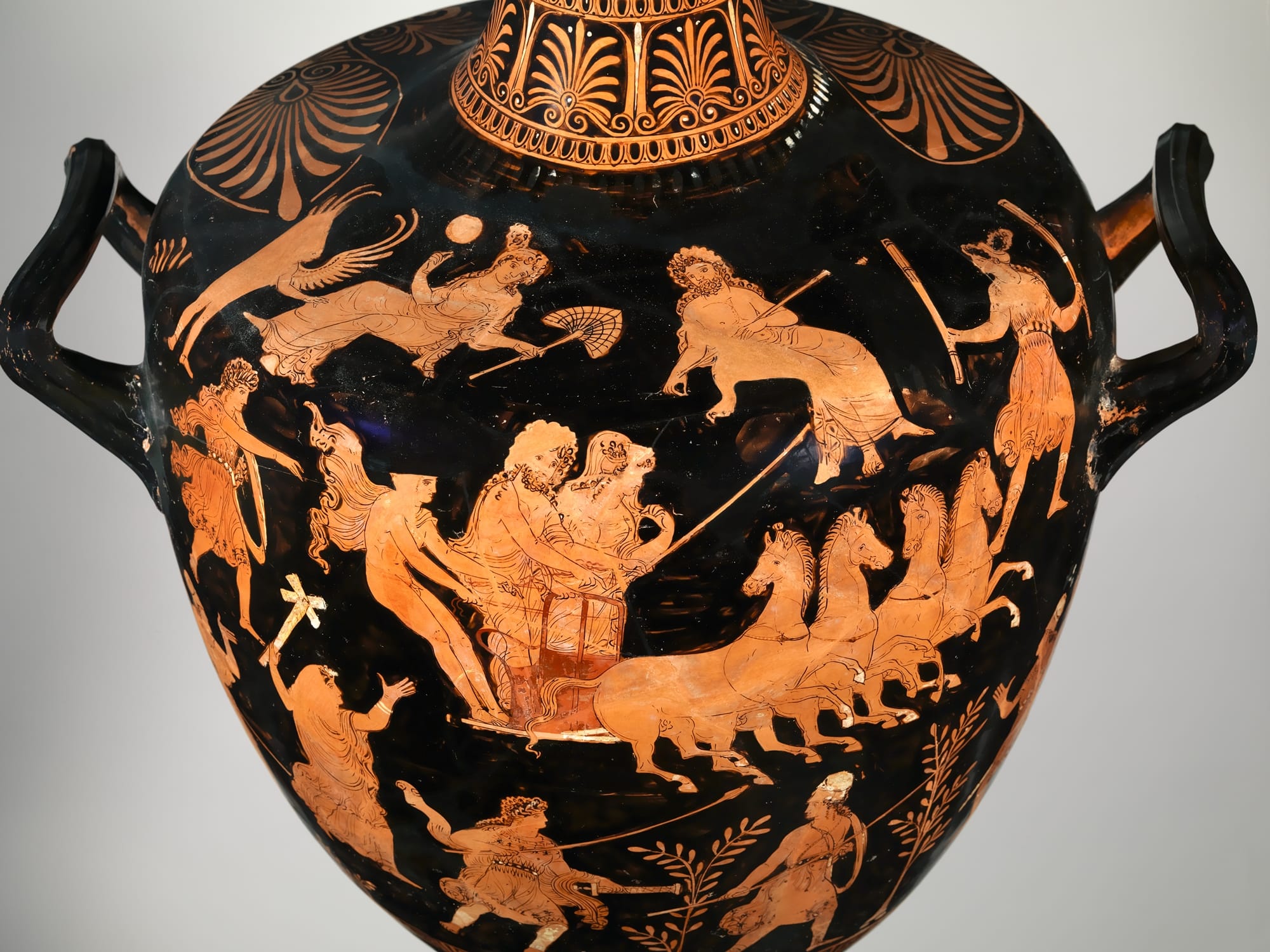
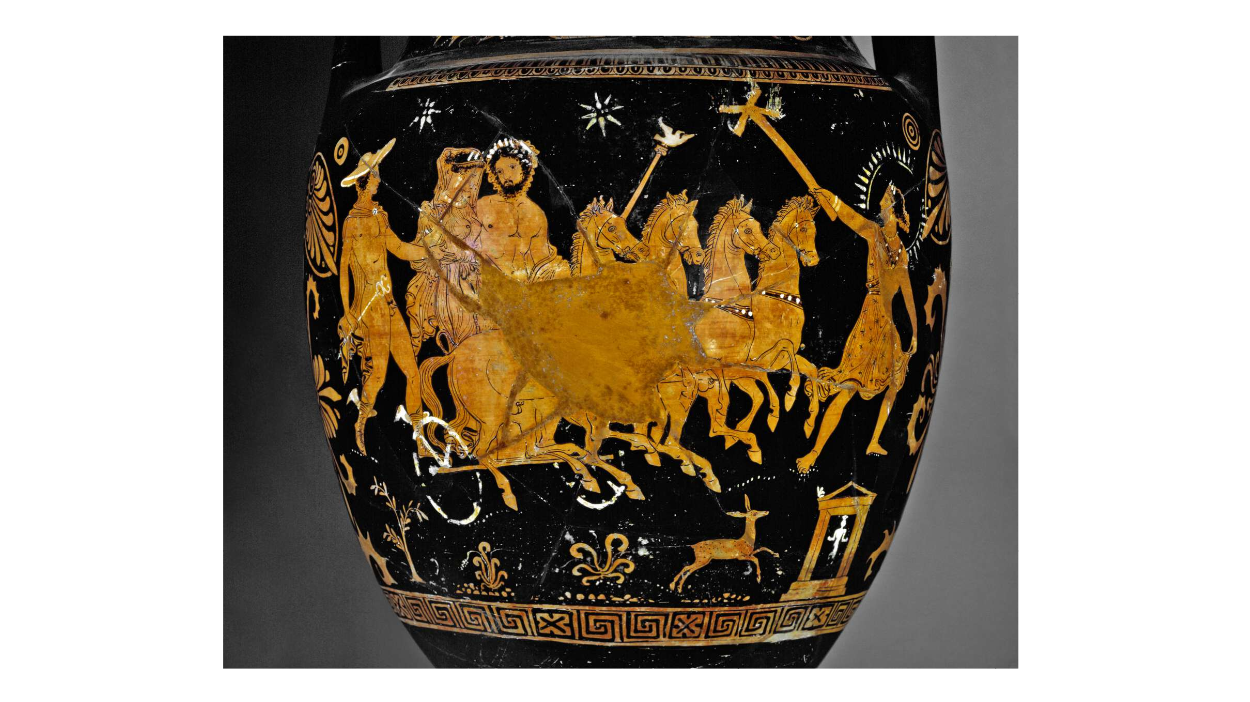
In Persephone's final moments on the surface, she remained hopeful that she would be able to reunite with her mother again. Her final shouts for help remaining ever present - until Demeter finally heard the daughter's call.
[...] and the heights of the mountains and the depths of the sea rang with her [Persephone's] immortal voice: and her queenly mother [Demeter] heard her. ("Homeric Hymns 1 - 3", II. To Demeter l. 33 - 39)
Demeter searches for her daughter, but is unsuccessful in her search. She learns through Hecate that an abduction had taken place, but Hecate had been unable to see the perpetrator. They continued their search until they found Helios, who told her the whole truth:
“None other of the deathless gods is to blame, but only cloud-gathering Zeus who gave her to Hades, her father's brother, to be called his buxom wife. And Hades seized her and took her loudly crying in his chariot down to his realm of mist and gloom. Yet, goddess, cease your loud lament and keep not vain anger unrelentingly: Aidoneus, the Ruler of Many, is no unfitting husband among the deathless gods for your child [...]" ("Homeric Hymns 1 - 3", II. To Demeter l. 76 - 80)
After receiving this information, Demeter decides to leave Olympus out of grief for her daughter and anger at Hades, and traverses the world while disguised as a mortal. More than half of the hymn focuses on Demeter's experiences while mingling with the mortals, however, even after the goddess eventually reveals herself she is still mourning the loss of her daughter. This grief then caused “a most dreadful and cruel year for mankind”, which caused diminishing offerings to the gods of Olympus ("Homeric Hymns 1 - 3", II. To Demeter l. 303 - 307).
At this point, something had to happen, and that meant Zeus had to intervene. He sent Hermes to Erebus, hoping that Hermes would convince Hades to release Persephone, so that she could leave and reunite with her mother once again. This reunion would ensure that Demeter's wrath and grief would finally cease ("Homeric Hymns 1 - 3", II. To Demeter l. 307 - 312). This intervention worked, and Hades heeded Zeus' wishes:
"Go now, Persephone, to your dark-robed mother, go, and feel kindly in your heart towards me: be not so exceedingly cast down; for I shall be no unfitting husband for you among the deathless gods [...]. And while you are here, you shall rule all that lives and moves and shall have the greatest rights among the deathless gods: those who defraud you and do not appease your power with offerings, reverently performing rites and paying fit gifts, shall be punished for evermore." ("Homeric Hymns 1 - 3", II. To Demeter l. 358 - 363)
This speech seems to positively reinforce what has been told before, Hades, is someone that seems to be regarded as "no unfitting husband". Previously, it had been Helios who had mentioned that Persephone would be in good hands - and even now when Hades is telling Persephone to reunite with her mother, he says that this is what he wishes for her to do, so as to ensure she wouldn't be unhappy. Moreover, he reiterates her position of power while residing in the underworld, clearly providing her with status and threatening those that would not worship her.
Now, things are not exactly as they seem. While, at this point, Persephone is overjoyed, she is also unaware that Hades had already ensured that she was now tethered to the underworld and, thus, to him.
"[...] he [Hades] on his part secretly gave her sweet pomegranate seed to eat, taking care for himself that she might not remain continually with grave, dark-robed Demeter. ("Homeric Hymns 1 - 3", II. To Demeter l. 371 - 372)
Persephone is then brought back to the surface, where she is greeted by both her mother and Hecate, who are ready to return her to Olympus. Demeter's mistrust of Hades shows itself as she immediately wishes to make sure that Persephone would never have to leave her again:
Demeter was still holding her dear child in her arms, her heart suddenly misgave her for some snare, so that she feared greatly and ceased fondling her daughter and asked of her at once: "My child, tell me, surely you have not tasted any food while you were below? [...] For if you have not, you shall come back from loathly Hades and live with me and your father, the dark-clouded Son of Cronos and be honoured by all the deathless gods; but if you have tasted food, you must go back again beneath the secret places of the earth, there to dwell a third part of the seasons every year: yet for the two parts you shall be with me and the other deathless gods. ("Homeric Hymns 1 - 3", II. To Demeter l. 387 - 393)
Thus, the hymn to Demeter ends and while the core concepts of the story as told in the Theogony have remained the same, two important additions have been made known:
- Persephone, after having ingested some pomegranate seeds, is tethered to the underworld and has to spend a certain amount of time there.
- Persephone, as long as she is within the underworld, will be ruling as its queen.
The addition of the pomegranate seeds left a few things unresolved: Why would they tether Persephone to the underworld, and thus, to Hades? How could Persephone be given in a state of unawareness? The story implied any food would do this, but which foods do even exist in the underworld? Does the food even have to be from the underworld, or is just the fact that someone is 'eating' in the underworld enough to tether them? If this is the case, is Hades also tethered to the underworld?
Many centuries later, some of these questions are given an answer in Ovid's Metamorphosis: an epic poem trying to encompass 'all' of human history from its ancient beginnings until the death of Julius Caesar ("Metamorphoses"). The story of Persephone is once again retold; However, this scripture differs from the previous, since by now the myth - and these gods - have changed to fit within Roman Culture. These changes would also include the names used to refer to the gods in Roman art and culture (Newby 13 - 14).
The story of Proserpine, or as we know her - Persephone, is told through the words of a muse: Calliope [Kalliope]. The muses themselves had had their history told in Hesiod's Theogony as well, but, there had been no link between Calliope and the story of Demeter and Persephone until this point. The closest connection between Persephone and Calliope would have been her son, Orpheus, who had trekked through the underworld and made his case in front of Persephone and Hades, in the hopes of bringing his love back to life ("Kalliope", "Persephone").
Now, however, it is Calliope who sings these tales as part of a contest of song.
Ceres [Demeter] first turned the soil with curving plough, first ripened the crops and produce of the earth, first gave us laws: all things are Ceres’s gift. My song is of her. ("Metamorphoses Book V" l. 340 - 45)
This links back to the previous scriptures, to the Hymn of Demeter, and to the figurative tether between mother and daughter. Calliope sings about the actions of Cupid [Eros], who had been tasked by Venus [Aphrodite], to ensure that Dis [Hades] would fall in love with Proserpine [Persephone] ("Metamorphoses Book V" l. 332 - 84). It was this act that would lead to the abduction.
While Proserpine was playing in this glade, and gathering violets or radiant lilies, while with girlish fondness she filled the folds of her gown, and her basket, trying to outdo her companions in her picking, Dis, almost in a moment, saw her, prized her, took her: so swift as this, is love. The frightened goddess cries out to her mother, to her friends, most of all to her mother, with piteous mouth. Since she had torn her dress at the opening, the flowers she had collected fell from her loosened tunic, and even their scattering caused her virgin tears. The ravisher whipped up his chariot, and urged on the horses, [...] ("Metamorphoses Book V" l. 389 - 97).
Ovid's retelling focused heavily on the girlish nature of Proserpine, as well as her virginity. Furthermore, it is evident that the abduction would not be where this would stop. While previous scriptures spoke of Hades as a husband, Ovid's metamorphosis clearly states the sexual nature and desire behind these acts. The first instance of sexual assault is already stated as Dis and Proserpine are still on their way to the underworld, as they pass a water nymph Cyane:
She showed herself from the pool as far as her waist, and recognising the goddess, cried out to Dis, ‘No’, and ‘Go no further!’ ‘You cannot be Ceres’s son against her will: the girl should have been asked, and not abused. ("Metamorphoses Book V" l. 405 - 12)
Cyane, mourning the rape of the goddess, and the contempt for the sanctities of her fountain, nursed an inconsolable grief in her silent heart, and pined away wholly with sorrow. ("Metamorphoses Book V" l. 425 - 29)
The story, as Calliope continues, shares its similarities with the Hymn to Demeter. Ceres began to search for her daughter, until she came across Cyane's remains. There was enough of the nymph left to indicate the truth of the matter to the goddess: Proserpine had been taken. In her anger, Ceres caused the destruction of the soils and fields, which endangered mankind ("Metamorphoses Book V" l. 477 - 86). Ceres learns of her daughter's fate through another nymph, Arethusa, who mentions that while Proserpina was still in a sad and fearful state, she was also the queen of the underworld and "the greatest among the world of shadows, the powerful consort, nevertheless, of the king of hell" ("Metamorphoses Book V" l. 500 - 8). Arguably, the nymphs seem to have taken the places of Hecate and Helios from the earlier variations of the myth, a witness to the abduction and the witness to reassure that Persephone is probably not having the worst time of her life, even if she is being held captive.
Now, quite unlike in the Greek myths, however, Ceres is asking for Jupiter's [Zeus] help. Jupiter would then tell Ceres that Dis had acted out of love, and that Dis, who still is Jupiter's brother, wouldn't be the worst son-in-law to have. He concedes that Ceres could separate the two again, if only "no food has touched her [Proserpine] lips, since that is the law decreed by the Fates" ("Metamorphoses Book V" l. 510 - 32)
[...] and Ceres felt sure of regaining her daughter. But the Fates would not allow it, for the girl had broken her fast, and wandering, innocently, in a well-tended garden, she had pulled down a reddish-purple pomegranate fruit, hanging from a tree, and, taking seven seeds from its yellow rind, squeezed them in her mouth. ("Metamorphoses Book V" l. 533 - 40)
Now Jupiter, intervening, between his brother and grieving sister, divides the turning year, equally. And now the goddess, Persephone, shared divinity of the two kingdoms, spends so many months with her mother, so many months with her husband. ("Metamorphoses Book V" l. 560 - 66)
Ovid's retelling of the myth of Persephone, thus, elaborates on the rules of the underworld: The rule regarding the consumption of food in the underworld is due to the decrees of the Fates. Pomegranates actually do grow in the underworld, and this time, Persephone herself causes her fate, as she had innocently and naively eaten some of the pomegranate seeds. Zeus still meddles and ensures that Persephone will be spending an equal amount of time with both Hades and Demeter.
These scriptures all have their similarities; Elements that were previously established as the "essence", or core, of the story have mostly remained intact. Arguably, it is only our fourth core element that lost its meaning due to the lack of interference from Jupiter within Ovid's tale.
- Zeus was the one who allowed for this to happen, or even "gave" Persephone to Hades.
In Ovid's tale, Jupiter is fine with the events that had transpired, but he had no immediate connection to these events. The perpetrator behind the events were Venus and Cupid, who caused that Dis would fall in love with Proserpina. Therefore, this core-element might need to be amended. The new list regarding the core-elements of the story of Persephone would thus be as follows:
- Persephone had been taken against her will.
- Aidoneus [Hades] was the perpetrator.
- Persephone hadn't just been taken, she had been taken away from her mother.
- A third party caused the inciting incident through their actions and Zeus was fine with this arrangement.
- Persephone, after having ingested some pomegranate seeds, is tethered to the underworld and has to spend a certain amount there.
- Persephone, as long as she is within the underworld, will be ruling as its queen.
There is one additional element that has been a common thread present within all of these stories. This element cannot be separated into just "one" point within the argument, since it's essentially the sum total of Persephone's characterisation and her story:
Persephone is not given any agency, she's treated as barely more than an object.
What about Persephone's agency?
All throughout the previous sections, it was made apparent that Persephone is tethered to places and people in more ways than one. To repeat a previous note, this is not the story of Persephone, or Proserpina; It's not even the story of Kore. No, this is the story of Demeter, of Ceres, of the mother that had lost her Κόρη.
In the time before her abduction, Persephone is Demeter's daughter. A claim so strong that it has overtaken her name. Persephone, at this point, is Kore. It can be argued that this direct claim is also a claim of ownership by Demeter. She named her offspring. Demeter declared that this child was hers.
[T]he bond between Demeter and her offspring is indestructible. Demeter's maternal qualities are truly and continually at work. Indeed, the goddess is inseparable from her daughter the beautiful Kore [...].(Brulé 13 - 14)
This form of ownership had not been challenged by anyone until the moments of their separation. From the moment of the abduction, two different claims of ownership are made:
First, there is Zeus' claim to ownership of Persephone, as he is the one who "gave her away" to Hades. He was the one who decided that his daughter could be a good gift to appease his brother, who had to reign the underworld. This form of ownership follows the same logic as Demeter's, as it is based on their parental ties to Persephone. Second, there is Hades' claim to ownership of Persephone as soon as the abduction takes place.
Removing Persephone from the surface, keeping her captive as a consort, as queen, as someone at his side within the underworld is a direct claim of ownership. Zeus accepts this claim, while Demeter does not. Persephone's opinion is disregarded.
Now, when Demeter's wrath causes Zeus to reconsider his previous acceptance and challenges Hades claims, that's when Hades uses further means to ensure that Persephone remains his. The forced ingestion of the pomegranate seeds is a means to support his claim and to ensure that Demeter cannot undo what's been done.
The closest Persephone comes to having agency is in the Metamorphosis, where she is the one to ingest the pomegranate juice herself, though even there, she had done so unaware of the consequences that this action would bring.
Throughout the story, Persephone is not allowed to act, and if she tries, she is ignored. She's not even the focal point of her own story. And even her name is being used to define to whom she belongs.
But Kore has eaten a pomegranate seed, an almost magical act which binds her to the lord of the Underworld. No one can return 'intact' from the 'house' of Hades, (...) so the break is accompanied by a change of name: Demeter's daughter will henceforward be known as Persephone. (Brulé 13 - 14)
Persephone, as Kore, is a reflection of what she had once been: a daughter, a girl, a maiden. However, the actions of Hades would cause a change, and if we follow the less subtle statements of Ovid's metamorphosis, it caused the loss of her innocence and virginity. Thus, this would be the reason behind the shift from Kore to 'dread' Persephone, a character that has as much a reputation as feared as Hades himself.
Throughout it all, Persephone went through the underworld and back, suffered in multiple ways and had her agency undermined and disregarded. We know that Persephone was happy about her return, but there was no indication that she would have acted on her own.
There are multiple retellings of this story, and many of them try to provide Persephone with that agency that she had originally been denied. Both Hades (2020) and Stray Gods (2023) heavily feature the character Persephone, but they've done so using rather different approaches.
Adaptation of mythology in contemporary times
Previously, it had been established how myths would adapt and details would differ depending on additional circumstances. All of this leads to the idea that myths “must, in order to be accepted in the first place, conform to the community’s norms [...]” (Edmunds XXIV). Thus, one way to adapt the story of Persephone is to change it to fit and conform to our norms.
This is the approach that Supergiant Games' Hades takes. There, Persephone's history is much the same, while simultaneously rather different.
Persephone's absence in Hades (2020)
The game is not about Persephone. This game is about about Zagreus, the son of Hades, who is trying to the escape the underworld and reach the surface after having learned that his birthmother resides there. Zagreus is given the help of the other Olympians, even though, they are unaware of the reason why he is trying to leave the underworld in the first place. Meanwhile, Hades is trying to stop him. All the while Zagreus nurtures certain questions, namely: Why would his mother have left them in the first place? And why had Hades never mentioned her before? Why had he been raised to believe that Nyx was his mother?


Thus, it becomes evident that the motivation behind Zagreus constant escape attempts is to finally meet Persephone and ask her these questions. However, even this titbit of information already provides those that are familiar with the myth of Persephone with some additional questions.
If Zagreus had never seen Persephone up until his successful escape from the underworld, then that would indicate that Persephone does not actually have to visit the underworld. This goes against what we've previously established: Shouldn't she be tethered to the underworld in such a way that she has to return on a yearly basis? How could Zagreus not have seen her?
Moreover, the little bits of information that Zagreus is able to find throughout his many attempts to reach the surface all seem to lead to the same conclusion: Persephone, while having once resided in the underworld, had decided to leave and had not returned since.
Now, reaching the surface wasn't enough, as the final obstacle between Zagreus and Persephone turns out to be Hades, who presents himself as another near impossible obstacle within his son's path.
If Zagreus dies after having reached the surface, a new Olympian graces him with their presence:

The power she grants is... ice. The goddess of seasons, as the game titles her, makes it rather clear that she herself is in quite a cold emotional state. Throughout their interaction, one can notice her dislike for humanity. When Zagreus speaks of this to his friend and mentor Achilles, the other wisely states:
All gods and goddesses are to be feared. Demeter, she has the power to give life, or to take it. Seems she's more interested in the latter, though. (...) and your father seems to harbour a particular dislike for her. I don't know why. Be careful. (Achilles to Zagreus, in Hades, SuperGiant Games)
Working with Demeter's gifts and bonding with her slowly provides us with more information about someone that's very dear to the goddess; her daughter.

Slowly we uncover more and more about this elusive daughter of Demeter: Her father having been a worshipper of Demeter, by now long gone. The daughter herself, according to Demeter, having been long gone as well. The goddess acknowledges that their relationship hadn't always been the best, but her her daughter is still heavily missed - and since Demeter believes the mortals were to blame, they were the ones to pay for this loss.
For those that are aware of the Hymn of Demeter, or even Calliope's song about Ceres, this seems oddly familiar. Previously it had been established that Persephone's paternal link had often been Zeus, however, it is also evident that the ties to Demeter are stronger than any potential link to Zeus. Thus, being confronted with a potential daughter of Demeter that has been absent, or removed from her mother's side, would certainly cause some realisations; Especially, since Persephone herself is already an established part of this story.
This naturally doesn't mean that Zeus would not interfere while talking about Demeter. He, too, likes to provide his hindsight regarding the other goddesses' ire:
You must forgive the Lady Demeter her scornfulness, Nephew, for she is still recovering after the sudden disappearance of her daughter, though it was quite some time ago the girl, poof! Just vanished. I try to lighten up the mood around it every now and then, but no, a sore spot, still! (Zeus to Zagreus, in Hades, SuperGiant Games)
The Lady Demeter still prattles on about her missing girl, Zagreus. But I want you to understand something, all right? She's gone. We all have grieved. Perhaps Demeter shall finally accept what has occurred, and we can move forward, having grown stronger as a family. (Zeus to Zagreus, in Hades, SuperGiant Games)
At this point in the game, any familiarity with the myths will lead to the attempts to theorise and categorise: Demeter is unaware of her daughter's whereabouts, but believes her to be gone. She also blames the mortals for it, which might explain the cold attitude. It would also mean that Zagreus is unaware that he is actually conversing and bonding with his grandmother.
Now, even for those unaware of the mythology and the heavy ties between Demeter and Persephone, the game will provide one with decisive evidence if one decides to improve their relationship with Demeter further. At this point, Demeter opens up once again and this time she refers to her daughter by name:
I hear rumours (...) Kore we called her then. Persephone is what she called herself. Before she vanished utterly leaving no trace. (Demeter to Zagreus, in Hades, SuperGiant Games)
There are two important details to take from this, for one - while the ties between Demeter and Persephone have remained present, their relationship had been far from 'great'. Instead, Demeter admits that there had been multiple arguments between the two. What the game implied through its text had never been hinted at in any of its source texts. Second, Persephone chose her name. In this version Demeter still named her daughter Kore, but dissatisfied with this Persephone would then name herself. This change of a name happened while she was living with her mother on Olympus, no physical separation was necessary. This time the change in name does not reflect a change of her nature, or a change forced upon her, but instead symbolises the freedom to choose and separate herself from her mother on her own terms. There, the argument stands that this is less a separation from her mother as a whole, but more a separation from simply being 'the daughter'. Persephone chooses to be more, she wishes to move on from being 'the girl', 'the daughter', or even 'the maiden'.
These few bits of lore already reframed multiple aspects of what one may have come to expect from the story of Persephone. However, there is another thought that might have presented itself after reaching this point.
This story does not actually take place 'after' all of Persephone's story had been told. Instead, we are still somewhere in the middle: Demeter never learned of what happened to Persephone. There are no ties that force Persephone to remain in the underworld in any way... It is not too far-fetched to believe that the conclusion of the tale had not yet come to pass.
Persephone vanished before she could have been found in the underworld, with no other trace than that she is somewhere on the surface out of reach for both Hades and Demeter - and that she chose to be there of her own accord.
Persephone's appearance in Hades (2020)
As Zagreus continuously fights through the underworld and confronts his father, one thing will become ever so clear: Hades knew exactly where Persephone had been all along.
Moreover, he was the one ensuring that none would be able to intrude on her little spot of land. It hadn't been until his son consistently tried to pass through and reach Persephone that he had to talk about any of this. However, the past events cannot be kept secret forever.
... Wait. Wait, just... if you... if you find her. If you somehow find her? Tell her something for me, tell her... Tell her Cerberus is doing very well. (Hades to Zagreus, in Hades, SuperGiant Games)
This short element provides more evidence to the fact that Hades still truly cares about Persephone. He had kept the letter in which she told him that she'd leave on his desk, the letter that Zagreus had found so many years later, and that letter asked of Hades that he'd look after Cerberus. Now, Hades asking his son to deliver this message, while seemingly insignificant, showcases that he had always taken Persephone's words and wishes to heart.
Zagreus asks his father if he knew why his mother had left, but Hades succumbs to death before he could answer; leaving his son alone on the surface.
There Zagreus wanders through Greece until he finds a cosy cottage and its resident. Previously, the world had been surrounded by snow; but here, it is warm, and the harvest seems plentiful. A woman is tending to her harvest and is shocked that someone would dare to intrude. Moreover, she is appalled and angry as she listens to this young adult claiming to be her son.
As it turns out, Persephone had left the underworld because she thought that Zagreus had died during childbirth. Neither had known about the other for years. Sadly, they didn't have too much time to answer most of their respective questions. As time went on, Zagreus began to feel worse for wear. However, Persephone recognised what her son's weakened state meant:

Zagreus cannot remain on the surface for long. Unlike the myth, it isn't Persephone that is tethered to the underworld, instead it is Zagreus and Hades. That this tether is in accordance to the Fates wishes remains the same. During their final moments together, Persephone asks for Zagreus to return to her once again, so that they could continue their talks - and her son promises to do so.
The next few runs, if successful, will always lead Zagreus back to his mother. There they talk, and there the story of Persephone is slowly being revealed to the player.
She reveals that she had left Olympus and had ended up in the underworld, where she had taken up residence in the house of Hades. She mentioned that while the other residents of the underworld had always been kind to her, she never felt like she had belonged. Persephone reassures her son that Hades had never mistreated her, that he had been kind to her and that she had been doing well. However, during her pregnancy all her fears and concerns had reappeared.
[...] Because... a child born of surface-dwellers could not live, down there.[...] According to them [the Fates], yes. According to your father, and to Nyx. Even having heard.... I took my chances anyway. But when you emerged stillborn... it was too much. I fled. I fled, and came to reside here. Above the notice of the Underworld. Beneath the notice of Olympus. (Persephone to Zagreus, in Hades, SuperGiant Games)
This conversation is cut short and leaves the question of why Hades would ever have concealed Zagreus' later survival from Persephone. As Zagreus is once again succumbing to death, Persephone asks him to speak to Hades and ask his questions - because she too wishes to know. Thus, they part once again.
With more knowledge, Zagreus returns and tells Persephone that Hades had not lied. Zagreus had died, as according to the fates, Hades was never meant to have an heir. Nyx, however, had given Zagreus enough life force to revive him - and managed to talk to the fates to ensure that he would be allowed to live. However, because this process had been time-consuming, Persephone had already left the underworld - and Hades had thought it the better choice to keep this from her.
Persephone is shocked and wonders why Hades would keep their son's survival from her, and as Zagreus once again succumbs to death, he asks her if she would have returned, had she known that he was alive. She immediately reassures him that she would have done so, to which Zagreus replies that, maybe, Hades had simply tried to ensure that she would not have to do so.
Throughout their next visit, they talk about the potential reasons why Hades would have wanted for Persephone to remain on the surface, and Zagreus slowly suggests that maybe - since Nyx and Hades seemed to care for her that much - maybe they had been trying to protect her. Now, Zagreus mentions that even though Persephone had been living on the surface, no one from Olympus is aware of her whereabouts. Persephone asks him what he knows about them, and Zagreus admits that he had received their help as he made his escapes. Persephone is shocked to think that he might have led the Olympians to her place, but Zagreus reaffirms that the Olympians still believe that he is simply trying to escape from his father and that he would wish to join Olympus. From her reaction, it is pretty clear that Persephone does not seem to have liked her stay at Olympus much.
While some of this could have been inferred through the way Demeter had spoken about her daughter, it is confirmed when Zagreus meets up with Persephone yet again. Unlike Demeter, she speaks rather bluntly about her feelings. And thus we finally come to learn, at least partially, why Persephone had been absent from Olympus:
Persephone: I could not stand it on Olympus, Zagreus. The blustering, the posturing... my overbearing mother... none of it. I would have left the mountain voluntarily, except...
Zagreus: ...Except Father absconded with you, didn't he? Dragged you down with him into the Underworld. [...]
Persephone: That fool is trying to protect me even now. It wasn't he who absconded with me, my son. And it's more complicated even than that. I was content to leave. Willing to make my life within the Underworld. With your father.
Zagreus: I dare not ask who did bring you to Father, then. So, essentially, you ran away from home, to live with him? [...]
Persephone outright refuses to tell Zagreus who had been the person that 'brought' her to Hades in the first place, though if one referred back to the Theogony, one could make an educated guess who might consider making such a decision and disregard any potential future consequences.
Consequences such as a war between the underworld and the Olympians, and probably especially Demeter, should they become aware of what had actually happened. Persephone realises that Hades would have been aware of this too and, thus, would have ensured that no one would ever learn of this; protecting Persephone's little cottage all the while - hiding it from anyone's view.
With this realisation, Persephone asks Zagreus to stop visiting her. For his and their overall safety. He is shocked and angry that she would take his father's side after all this, but Persephone insists that this would be for their best. She apologises for her own selfishness, as this potential war would be devastating. Each visit of Zagreus would increase the risk of future discovery, and thus, he should stop his visits altogether.
Zagreus asks if she would consider coming back, though she refuses, leaving him to wonder if she would simply continue to live alone and without him. Persephone reassures him that she would love to be with her son, but that it was not feasible and that things had changed too much in the underworld. Even if Zagreus wished to fix things, there was no way Hades would still feel the same about her, nor wish for her return. Persephone wishes him goodbye, as he once again succumbs to death, but Zagreus refuses to let this be the end.
Persephone: [...] you don't need to prove anything to me. Please don't do anything rash. All of us made our choices. Now we have to live with them. Isn't it enough, to know that I am safe? That I'm content to be alone?
Zagreus: [...] it's not enough, for me, because... this blasted family... it cannot just keep hiding from its problems! Running from them! [...]
During his next visit, Zagreus mentions a portrait of her, found in Hades bedchambers, that depicted her in her regalia from the underworld; This functions as more concrete evidence of Hades' feelings for Persephone, since he had never parted with that portrait. However, Zagreus then asks his mother wether she had ever truly loved Hades in return.

What can be inferred after all these visits, is the following:
- Persephone had been on Olympus, where she had been unhappy.
- Persephone had a rocky relationship with Demeter. To separate herself a bit further, she started going by Persephone instead of Kore.
- Persephone wished to leave Olympus, and it had been Zeus who had brought her to Hades.
- Persephone acknowledges that this had been her only way to leave, thus, not giving her much of a choice - but one she had taken gladly.
- Hades had been kind enough to provide her with her own space, and they grew to like each other romantically as time went on.
- While she enjoyed her stay, she never felt like she belonged to the underworld. A concept that she felt had been proven, as her son died during childbirth.
Zagreus once again appeals to her and asks if she could be persuaded to at least visit them again, or Nyx, or even Cerberus. However, Persephone remains unsure about this due to the danger of Olympus finding out. During Zagreus' final visit to the cottage, he comes across a Persephone that had just finished packing - having made the decision to return once again and to try and find a proactive solution to their current problem. Thus, ensuring that there would be no war between the gods.
Throughout many more runs, Persephone comes up with a new plan, where they'd invite the gods with a banquet - and surprise them with Persephone's presence in a friendlier setting - to explain family relations and to ease any potential tensions. Zagreus handles the invites, the banquet is held, and it is a success.

However, not all tension was lost. There is still one character who wishes for more time with Persephone, especially with a Persephone that does not remain in the underworld forever; Demeter wishes to reunite with her daughter and to have Persephone return to the surface so she can return "to [her] responsibilities".
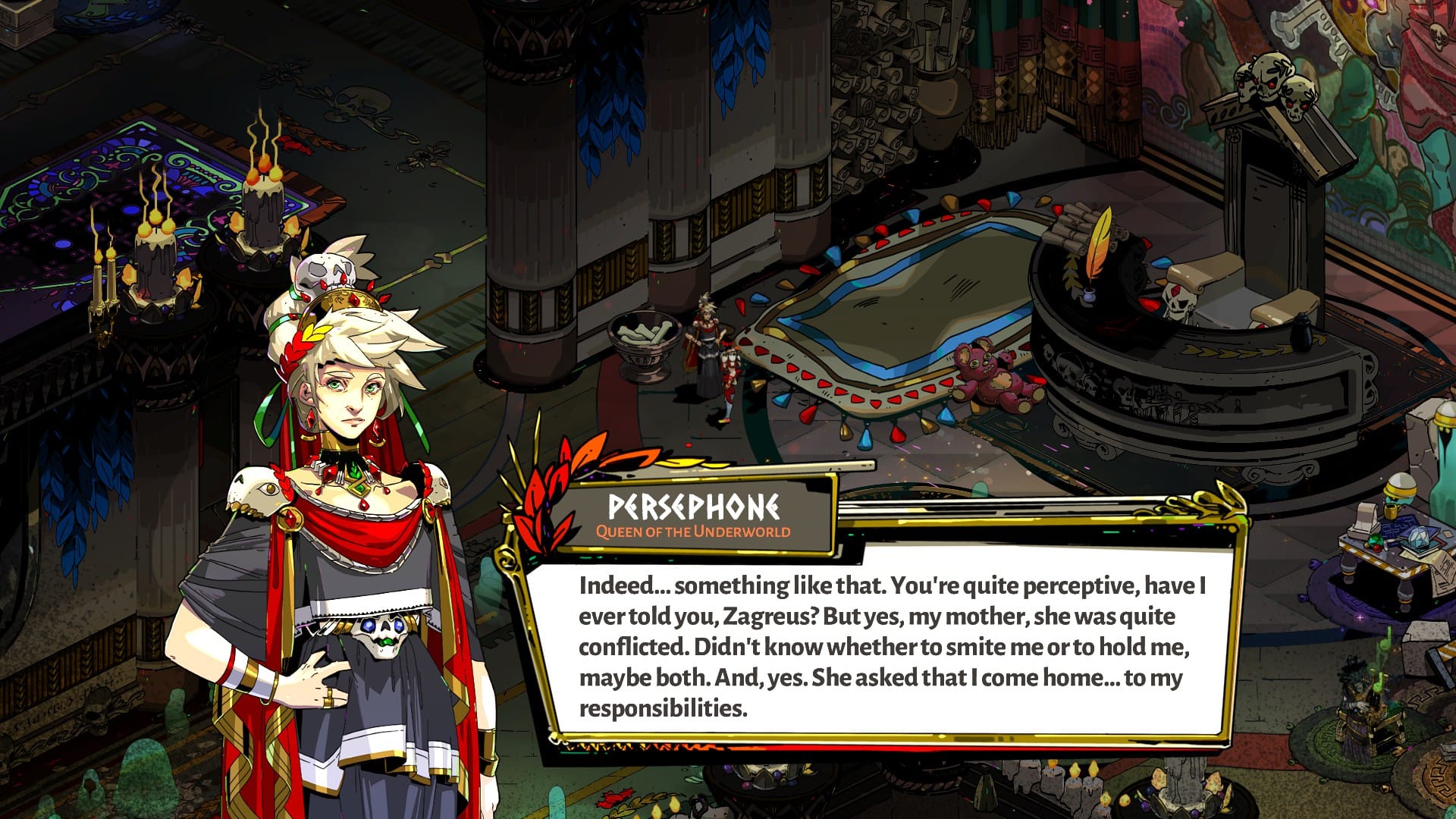
Gutted, Zagreus asks his mother to stay with them, but Persephone mentions that this would be the easiest way to ensure that their newly found peace would remain. However, she also promised that she would return to them. The next time Zagreus returns to the house of Hades, his mother will be gone.
With this, the myth of Persephone has been fully explored within the world of Hades. It is evident that its core survived, though, many of the rougher edges have been softened; while others have been sharpened. All of it with the goal of providing Persephone with her own wishes and agency as the story progressed. Her dislike of Olympus and her strained relationship with Demeter is now a clear motivation for her acceptance of Zeus' proposition. Her relationship with Hades is smoothed over, and it is made clear that their relationship is based on mutual respect and trust; And the closest thing to a 'tether' to the underworld would be her own wish to visit her family; Or to spend time with the other residents of the house of Hades.
What this reinterpretation of the myth does is, thus, re-framing many of the elements that would not be acceptable in today's culture. Persephone's relationship with Hades is based on mutual interest, while any form of mistreatment, abuse, or coercion is removed. While her initial presence in the underworld is still due to a third party interfering, Persephone has been given a lot more agency regarding her own life and presents herself as a headstrong and proactive person.
Even though this takes place throughout the myth of Persephone, as there had been no resolution present until the game's end; It is evident that Hades tries to adhere more strictly to its mythological sources. The story is the same; The characters are the same; And the end result is also the same. However, it re-frames and reconstructs the myth in a way that removes the abuse and suffering that Persephone had endured in favour of her own agency. Thus, Persephone is the one who decides on her own story's ending. It's not Zeus that declares she would return to the surface; There are no tethering pomegranate seeds. There is only Persephone, who wishes to keep the peace for her family's sake.
However, what happens if these myths are not being reframed; What if an adaptation tries to work within the original myth more violent framework?
The inciting incident of Stray Gods: The Roleplaying Musical (2023)
The story of Stray Gods takes place, as previously mentioned, in contemporary times. Our protagonist, Grace, is a passionate singer, who, together her friends is looking for another band-member. The audition ends up being a bust, and Grace ends up singing to herself - a song about being adrift.

However, another person heard her song and felt compelled to listen in. She apologises for her interruption, and she introduces herself as Calliope, saying that she's truly impressed by Grace's voice. Through name alone, we can infer that this is most likely one of the Muses. Moreover, the use of "Calliope" over "Kalliope" implies that a lot of her story and character might have been taken from Roman sources, as the other gods tend to be referred to by their Greek names. Grace is unaware of any potential mythological connection and simply inquires if the other is there for the audition, Calliope, after a short pause, decides to lie and confirms.
Grace: Okay! Did you, uh, bring an instrument, or some music?
Calliope: I kinda bring my music wherever I go.
Not needing much else, Calliope continues the previously established melody. Calliope, too, sings of being adrift.

The presentation of the world changes, it's given a more theatrical flair - impossible spotlights appear. This is the first hint of the power behind a Muse, their music seems to warp reality. It also provides the first confirmation of Calliope's true nature.
At this point, the player is given a choice between three different play- and or music styles. This choice will lock away certain paths of the game, while opening others during future confrontations and conversation choices.

Grace: Wow, what was that?
Calliope: Your song was just so wonderful, I had to finish it with you. I hope that's alright. I also know what it feels like to be lost, to feel as if you have no place to turn. That's why I had to come inside. (...) I am reaping what I've sown, I think. This has been a... a very long time coming.
Their song ends, they've come to an understanding. Calliope has to leave, promising to meet again; though that meeting happens sooner and under less cheerful circumstances.
Calliope arrives at Grace's house heavily injured. She cryptically apologises to Grace for doing "something" to her, "something" that she wished she could have done differently. Then she dies in Grace's arms. While Grace is panicking, a glowing orb leaves Calliope's body and fuses with Grace - and then another person shows up, in running gear, through a portal door. Ready to take Grace with them to the "Chorus". It's all a lot. Luckily, the person, who is Hermes, explains it rather quickly:
Hermes: When Cal died, you saw a shiny thing come out of her, right? That was her soul. That's what made her a god. It's in you now, which makes you a god. Surprise, right?
In a short span of time, Grace, now a Muse, learns that the Greek Pantheon was real; that the gods have lived hidden on Earth and that they can, if the body dies, merge their souls with another. Thus, the Chorus, and the people that make it, are gods that have undergone this process of dying and merging their selves with others through many millennia. The chorus consists of: Athena, Aphrodite, Apollo, and Persephone.
Athena: [...] and the one glaring at you is Persephone, once Queen of the Underworld. Together we are the Chorus. We rule over the Idols, our name for the gods who remain, all of us hidden in your modern world.

Now, the Chorus is aware that Calliope was murdered, and they believe it was Grace who did it. Thus, they wish to have her killed as well.
Athena: The reason you're here, Grace, [...] is because we have rules. Those rules mean we can't admit into our ranks a usurper. Pft, never mind a possible murderer. I know this will all come as a shock, and I'm so, so sorry to say it, but... I'm afraid you have to die.
Grace naturally disagrees - and she too uses, unintentionally, the power of a Muse. She can warp reality, in a way that has everyone sing. The characters are aware that they are singing and since Grace is not used to this sort of thing, she also calls it out herself.
Grace: Is it weird this is in song?
She will later learn that this power does more than just creating a musical; It's unearthing truth and emotions through song. While at this point unaware, Grace still manages to give herself some time to prove her innocence.
The game, thus, begins in earnest and Grace has to investigate and solve the murder of Calliope before her own time runs out. All the while she's making friends and foes of characters known through myth.
While the story is told mostly linearly, the attractions, the songs can differ heavily due to the player's choices. I can only respect the work that was put into the structures of these songs. Austin Wintory even posted a visual showcase for the complex song structures; and how complex even one of the first songs already was, with its multiple branches.
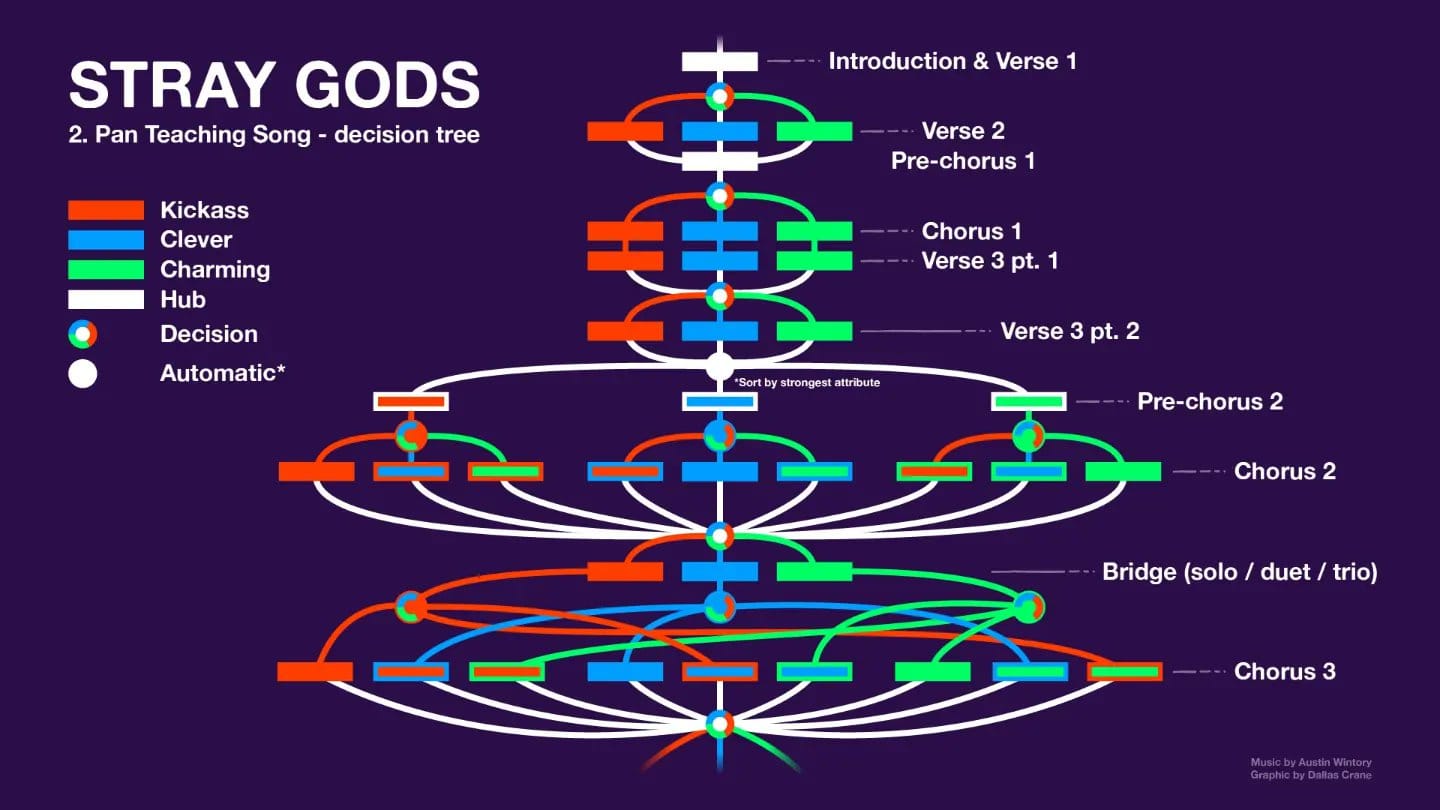
Pan's teaching song has three different 'main' versions: "Shine" (Kickass), "Morning Fades" (Clever), "Lost Girls" (Charming). It is the second choice the player makes right after the "Pre-Chorus 1" which decides the song's main 'theme'.

Another element that influences the song is the "strongest attribute" statistic, namely the amount of times a certain type (Kickass, Clever, or Charming) has been chosen. In this case "strongest attribute" reframes the setup for "Pre-Chorus 2". Lastly, Pan's teaching song has three potential endings per version (see Chorus 3).
What this means is that one playthrough could never reveal everything; Instead, you're simply given a glimpse of complexity depending on your approach.
Persephone, Grace's songs are of her.
...Or, well, they could be. It is complicated. Grace only gets to know a character, if that character wishes to get to know her in return - and this also applies to Persephone.
After being given her grace period, Grace is immediately confronted by her mortal friend Freddie, and a new immortal visitor, Pan. Freddie is supportive, and Pan provides Grace with her first potential clue - looking into Calliope's flat. There, she also meets Apollo, who also offers some help. This offer of help is not too unexpected for those that are aware of Greek mythology, since Apollo is regarded as "a patron of the arts" and a "leader of the Muses" ("Apollo").
He is also the one that reiterates, that not everything the mortals considered the truth about the Greek pantheon had actually been true, which allows this game some freedom in their adaptation.
Apollo: There were only three muses, you know. Not nine. Whenever they found someone who'd made something truly masterful, or created a new art form, they'd pass on their eidolon [soul]. Take a new name [...] They got it wrong, like they got almost everything about us wrong.
This also means that whatever we have established in the previous sections regarding Persephone, from these supposedly "trustworthy" ancient scriptures, may not actually resemble her story in this game. Though, it means that whichever stories had been correctly noted had taken place many years ago. If the Persephone myth is considered true, then this version of Persephone has long since had it happen to her. Unlike in Hades, Stray Gods would take place after any such events. Now, Apollo brings Grace to his home to meet Oracle, a hacker. There, Grace asks for more information about the flat and is being told that it had been "originally purchased two years ago by a holding company:" Kore Enterprise. The immediate assumption that Persephone might be behind this, due to the naming choice, is confirmed by Apollo. Though, he is surprised to learn that that would mean Persephone and Calliope had been friendly with one another. He then offers to take Grace to Persephone's Nightclub: The Underworld.
At the club, Grace is able to talk to Eros, Hermes, Pan, and Apollo once again to ask for and about Persephone.
Apollo: Well, if I know Persephone - and I do - she won't be up for a chat.
If one picked the trait "Clever" for Grace at the start, she is able to ask Apollo more directly.
Grace: My Greek mythology is a little rusty, but... isn't Persephone the one who was kidnapped?
Apollo: Oh, you know about that. What else do you know?
Grace: Just that Persephone was a sweet girl, and Hades, lord of the Underworld swept her off the land of the dead.
So even a "clever" Grace is only familiar with the mythology on a surface level. She did not read the Theogony, nor the Hymn to Demeter, nor does she have any of Calliope's memories that could have implied a truth behind Ovid's take on the myth.
Apollo: Without so much as a by your leave, yes. Her mother, Demeter, was so enraged, she blanketed the world in ice, rendering it barren and infertile. Zeus was forced to act. He decreed that Persephone would be shared between Demeter and Hades, and thus the matter was resolved.
Well, you asked. That's her story, as the mortals tell it.
Well, Apollo certainly did not go into detail. There was no instance of Zeus having had a role in the initial abduction, nor does it imply any potential tethers to the Underworld. The closest resemblance is once again the connection between Demeter and Persephone, further cemented through "Kore Enterprise". Now, Grace can ask if this story is actually true and Apollo will clarify that:
Apollo: [...] Hades did kidnap Persephone, that certainly did happen. The Idols almost went to war over it, until Zeus intervened and ordered Hades and Persephone to wed. That quieted things. At least until Persephone killed Hades.
[...]
Apollo: Persephone was punished for the murder, the Underworld taken from her... and we all stood by and let it happen. She has never forgiven us, and honestly? I can't blame her.
This is certainly quite a different direction to take, when talking about Hades and Persephone.
Stray Gods does what Hades didn't. Even if the game stated that things were not as mortals have told it, this was not a means to smooth things over and conform to the norm; Instead, this allows for the Idols to react and showcase their agencies.
Unlike in mythology, Persephone did not simply accept her fate; Unlike in Hades, there never was an implied positive romance. Instead, it took what the myth provided and reframed it through a critical and contemporary lens that only recognises Persephone's tragedy and suffering, which had been disregarded by too many. There is no attempt to conform to the norm, instead there is another attempt to give Persephone her agency.
In this tale, Persephone had her agency and freedom removed, through the kidnapping. These instances seem to follow the narrative that the mortals had created more closely. However, the difference lies in Persephone and the fact that she refuses to remain passive.
After her fate seemed sealed, she took action: She killed her abuser; And was immediately punished for it. She had been forced into the role of "Queen of the Underworld", then taken it by force after years of abuse - Only to then be pushed from what was now hers, once again removed from where she wished to be. Persephone still calls herself Queen of the Underworld, even if that is solely her nightclub at this point; but Athena and the other Idols are aware that they had removed Persephone from her position of actual power. The rules that Athena had recited at the start, solely exist because Persephone had taken her agency back.
Grace: So what happened to Persephone after...?
Apollo: The murder? She survived, like the rest of us. She got older. [...] I think she would have left us if it was allowed. It isn't, so instead she did as she pleased. She started a cult, became a crime boss... [...] but honestly? I've no insight into anything Persephone does these days.
All of this information is coming from an outsider, someone who is not aware of Persephone's current goals or motivation - and now Grace will have to challenge the Queen.
Persephone: Help you? [Laughs] Perhaps you could help me, instead. I'd like to understand a few things. Do you really expect us to believe that Calliope chose you? What's the real story? [...]
Persephone believes this to be foul play, and she mistrusts Grace immensely. Clear evidence of her troubled past reflected in her guarded state.
The song duel that ensues has seventeen potential outcomes, though, they may share certain bridges, or verses with one another. In the end, they will lead to one of four major resolutions:

Picking "I don't want to fight" results in Grace's attempts of de-escalation. Empathy and Sympathy are tools that a 'charming' Muse can use. In this case, Grace acknowledges what Persephone must have gone through and can either ask for the crowd to leave, or give Persephone the "win" in this duel. In these instances, Persephone, too, shows herself from a slightly more vulnerable side, making it clear that a lot of her current anger toward Grace had been due to her friendship with Calliope and her mourning her loss. A loss that is heavily linked, still, to her traumatic past.
Grace: If she had something to say, would you turn her away?
Persephone: Please don’t do this.
Grace: You’re lost, Persephone. You’ve buried yourself. On stage in the blinding lights, you’re hiding here. You ate a bad seed, that’s not on me. Rotten too long, blossomed all wrong.
Persephone: We change shape, in time, you’ll see. We all rot away into who we will be. Your youth wasn’t stolen, like it was from me.
Grace: Let me help you.
Persephone: Don’t touch me! I don’t need help from any of you. I was alone when you-know-who kidnapped and crushed all my dreams, ‘til a Muse… I just want Calliope back.
Persephone refuses to state the name of her abductor, and begs Grace not to bring up Calliope due to the wound still being so fresh. The link between those two characters is not too far off, considering the Calliope of myth had been aware of the song of Demeter.
In this instance, Grace tries to offer her comfort through a friendly touch, though even here it showcases the consequences of Persephone's suffering.
Grace: You overcame so much on your own. You should be praised. I’m done throwing stones. Please believe me, do you see me bowing down to you, my Queen? Underworld, I hereby concede. You wanted blood, well there’s no more to bleed. Your queen’s above that, now I get that. But can you help, Persephone? Help a lost little girl

When a de-escalating Grace is asking for help, the line "lost little girl" is used throughout the game, thus, one shouldn't completely tie it to Persephone either. Though, taking her past into consideration - there is an image to be evoked when speaking of a young girl's calls for help; And unlike the other gods, Persephone refuses to ignore the call and invites her to her office to talk.
Now, if Grace prefers to "kickass" then she will use this as her chance to drag Persephone. In these instances, She would use the fact that Persephone is behind the times, hidden away, and too stuck in the past to win. She can even go so far as to mention Hades. Grace will bring up the fact that Persephone had been "his", which considering her lack of agency in that matter is quite the low blow.
Grace: Oh wait, you’re she? THE Persephone? Oh boy! A celebrity, dissing me! Now remind me, P – jog my memory. Sorry, not up on my ancient history. Underworld, now that rings a bell… Was it you who was married to the king of hell? It’s hazy… Hades, so you’re his lady?
[...] Please teach me ABC’s. Me, I never featured in Euripides. So “where are they now” wow look around, you’re the big cheese of a hole in the ground.
Grace's mythology knowledge once again showing itself through lyrical prowess, the contrast of "jog my memory" and her name-dropping the Euripides, where there is a section about Demeter, and therefore, also through implications: Persephone.
"[T]he mountain mother of the gods rushed through the wooded glen, [...] yearning for her lost daughter, whose name may not be spoken." (Euripides. Volume 2, Helen. l. 1301 - 9)
On a more aggressive path, Persephone is more forceful as well; Never forget that she is the queen of the dead. Here it's not empathy or sympathy that allows Grace an audience with Persephone afterwards, but respect. Persephone recognises the force that Grace could be; and sees some potential.

If Grace uses more "clever" choices, she'll use the audience as a means to ensure a good show. Thus, Persephone will allow for a talk between them, mostly because everyone was entertained.
However, this is only the first hurdle to potentially getting to know the Queen. Grace, Persephone, and Apollo all end up in her office and there they discuss the murder of Calliope further. However, things go out of hand, due to the nature of Apollo's and Persephone's relationship. Apollo is still angry at her for her treatment and mistrust of Grace. As they both argue further and let their anger consume them, the Muse has to decide with whom she wishes to side - limiting the interactions with the other character.
If she sides with Apollo, Grace will be limited to mostly outsider perspectives of Persephone. Though, there is another song later, sung by Persephone - so not all would be lost. However, one additional source of information is Grace's mortal friend Freddie, who is, luckily, a mythology buff; And Freddie is calling this adaptation out for being quite 'unfaithful':

Freddie: [...] Her mother was so angry she created winter, but otherwise? Persephone was just your average sweet and virginal fertility goddess. [...] Must be hard to be defined by this one thing that happened to you thousands of years ago. I'd be pissed if everyone thought my story ended there.
This quickly reiterates the previously established 'core' elements of Persephone's myth, though, once again, Zeus' part in the inciting incident has been scrapped. The focus is put on. Persephone's 'innocence' and 'softness', often more commonly associated with Kore, and Demeter's anger causing a horrible time for mankind. Moreover, Freddie adds another layer of tragedy - since Persephone remains defined by her abduction. Hades is seen as the guy in power. Persephone, while feared and respected considering her "dreaded" epithet is still mostly seen as someone "at Hades' side". However, this game's iteration of Persephone makes it clear that she should be dreaded, as she is able to both wield power, and take back what power has been taken from her.
Now, when Grace sides with Persephone during the previous argument, a lot more information is given. The goddess is a lot more willing to talk about a multitude of topics. She can even be the 'mentor' for Grace and her new life among the Idols. During this discussion, Persephone will disclose some information about the last time she had 'passed on' her eidolon, or soul. It had been in 1952, where Persephone had saved a mobster's wife from his continuous abuse.

Persephone: I remember being disgusted I was ever that weak. Persephone made me strong. But it never really goes away. We all have our sordid history, our personal horrors, building up like sediment around our souls.
This reframes what we've heard about Persephone, from Apollo, at the club previously. Her becoming a "mafia boss" had more to do with helping another victim than establishing an actual crime network. However, it also makes it clear that Persephone will not refrain from violence. Persephone will reiterate this during a later conversation, when Grace asks her once again about her life before and after Persephone had passed on her eidolon.
Persephone: [...] Did I set out to become a mobster? Not exactly. My husband's friend thought I'd murdered him, however, so they came after me... and one thing led to another.
Through these conversations Grace also learns more about the eidolon and how it functions. Mostly, that people have a short time before they "remember" who they've once been; And after the veil of memories has lifted, some of the oldest would have been forgotten.
Persephone: You'll recall important moments. Some will be mixed up with the stories mortals tell, and you won't be sure which is the memory and which is the story.
Another interesting lore addition, that reframes previous statements. The line between the truth and fiction has slowly become blurry and whoever the Idols once had been, even if they feel stagnant, they've slowly changed.
Grace: Are you willing to talk about Hades? If you don't want to, it's fine, I'm just...
Persephone: Incredibly curious how I ended up murdering my husband? One might think my hatred of Hades began when he kidnapped me and forced me to be his bride, but honestly? That wasn't it. I hated my brothers and sisters for letting it happen, but Hades himself terrified me. He had a presence, one that forever made him the most important man in the room. And me? I was nothing in comparison. When Hades began doting on me, trying to earn my favour, I swooned that he might deign to think of me that way. For centuries, I actually thought I was in love. That the kidnapping was the best thing that ever happened to me. Funny how our perspectives change.
[...]
Persephone: I was a trophy for Hades, a conquest that he expected to remain meek and unchanging forever. He went out of his way to keep me small. I slowly realised that... he'd always been that way, manipulation and arrogance behind that handsome sneer. We battled for centuries. I hated him and I told him so, but he refused to part with me. He declared that I was his and would stay in the Underworld where I belonged. That's when I killed him, yes.
[...]
Persephone: In the end, they [The Chorus] decided it was better to humiliate me. They ensured I did not benefit from Hades's murder, and stripped the throne I'd wrested from his grasp.
Grace: Which you weren't happy about.
Persephone: I asked them where they were all those years while I pleaded for help! I was held captive, and what was I expected to do? Lie down and take it forever because Hades was more useful to them alive? No, I stopped doing what was expected of me the day I slit his throat. [...]
This adaptation, which provides Persephone with a certain amount of agency and acknowledges the horror that she went through, allows for something that had been barely existent in Hades.
Persephone, like so many characters in Stray Gods, still bears the scars of all her lifetimes. Moreover, her initial history with Hades was violent and forceful in more ways than one. The goddess admits that, at first, she hadn't even realised how horrible the kidnapping itself had been. That she had been fine with it, until many years later.
Her mistrust of the Olympians and her distaste for Apollo were rooted in more disappointment and trauma. According to Persephone, she had wished to visit her mother and dared to flee the underworld. She managed to reach Olympus, where she had once again called for help when she saw Apollo, but none of the Olympians had acted. Hades, meanwhile, had simply shown up and recaptured her.
[...] there's an old saying that no one escapes the Underworld, but that's not true. I did, once, not long after Hades kidnapped me. I was homesick and I missed my mother. [...] I waded through darkness itself to get out of there. Hades chased after me relentlessy, but I evaded him. Right up until I got to the very slopes of Olympus, and who do you suppose was the first Idol I met? Apollo stood there. I cried out to him, begging him not to let Hades take me, and yet Apollo did as he's always done: absolutely nothing. Hades was thrilled, and I knew then and there I could never rely on my so-called family for anything, ever again.
Her attitude, the choice of isolation and mistrust, is all based on this idea that she had been betrayed and disappointed in the past. From her perspective, the only one she can fully trust is herself. That was why, even though she and Calliope had become friends, and lovers at some point, there had never been a full exchange of trust. Now, with Grace, Persephone still does not trust her enough to provide her with all the information, and, thus, all parts of her plan. The distance between her and Grace becomes even more evident through the desk standing in-between them. A contrast between her sharing her past and withholding her future.
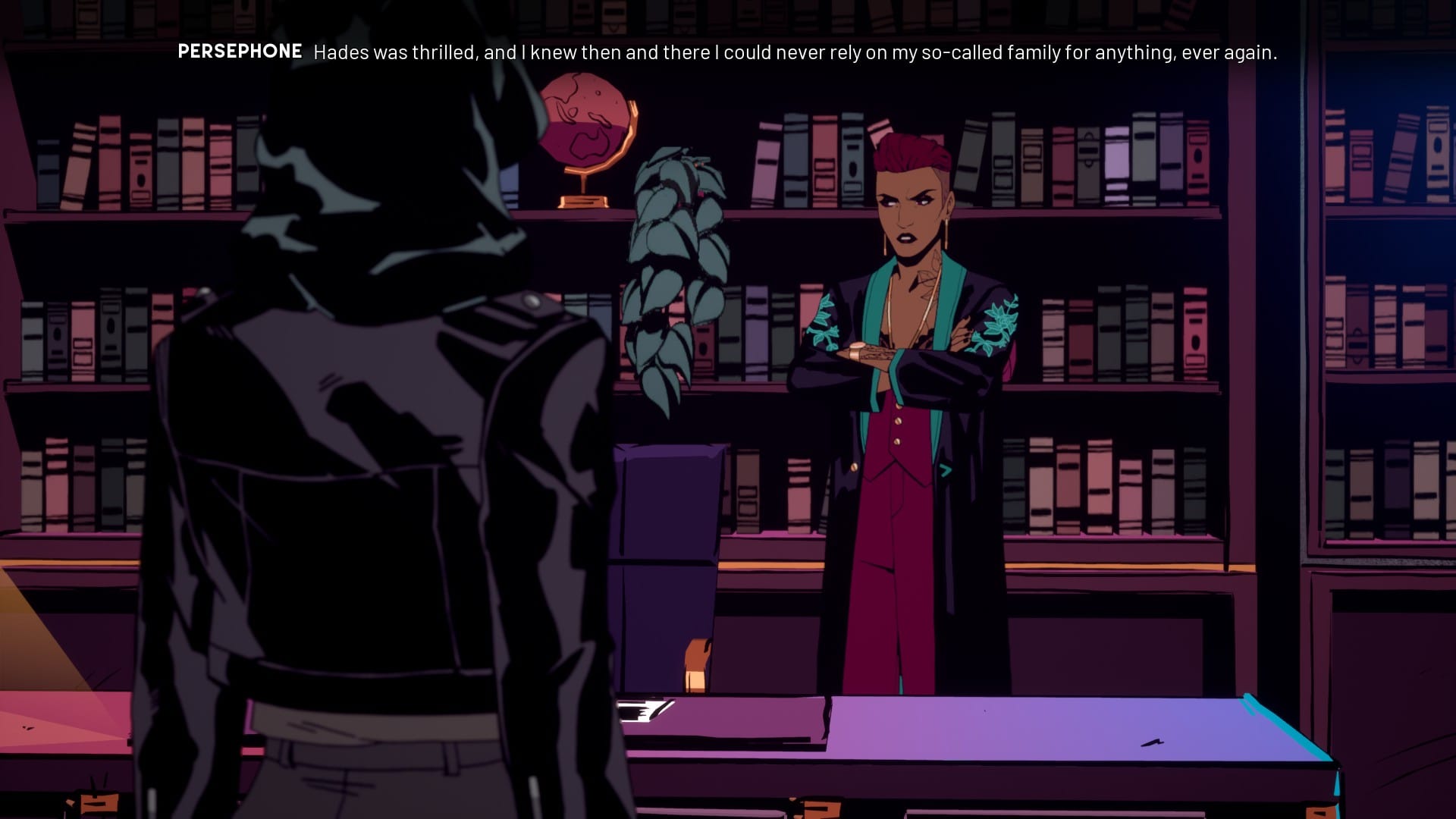
Overall it can be said that this Persephone will not take any prisoners. She is someone that the Iliad or Odyssey would describe as "dread" Persephone.
It is interesting to note that Persephone's goal throughout the game turns out to be to reclaim her throne. It had been stated that the Idols were the ones that had been limiting her actions and agency by removing her from the underworld. The throne that Persephone had killed for after years of suffering again out of reach. Persephone's distate of the Idols was never a secret and it had been this shared unhappiness that had brought Calliope and Persephone together. Both of them had wished for change. There had been a comraderie and understanding between Calliope and Persephone. A comraderie that is also built up between Persephone and Grace as they continue to meet and talk about the state of the Idols and the case at hand.
The dichotomy during these talks is palatable. She presents herself as distant, but offers many answers and explanations to any of Grace's questions. However, she will always lie by omission about needing Grace for the trip to the Underworld; Her one chance to revisit what has been barred from its rightful ruler.
In regard to her past, she will once again confirm a previous theory, namely that Idols "tend to seek out successors like [them]selves". Thus, Persephone's choice to help a mobster wife by killing the mobster himself seems certainly not far-fetched. Her anger and grudge against the other Idols as well as her wish to reclaim her lost throne are aligning with her constant desire for power. Persephone despises weakness, and denies it, whenever possible. Another leftover from her past. Thus, she is someone that wishes to help the victims of abuse, but she also wishes to use and enforce power. Persephone is shown to be a headstrong and proactive person.
Two sides of the same coin (for charon).
Both Hades and Stray Gods offer Persephone what she had been originally denied: Agency. However, both adaptations also limit her agency. In Hades, she still is given limited choices, and in Stray Gods, her agency leads to further punishment. Neither story has Persephone tethered directly or forcefully to the underworld. Instead, she wishes to remain there. Be it for her family, or for her throne and legacy.
The difference in her story depends heavily on the goal of the adaptation. Hades tried its hardest to smooth over many of its mythological roots, while adhering to the sources as much as possible. Stray Gods, by contrast, immediately disregards the notion of an "impeccable" recreation of a myth on one hand, while on the other heavily focusing on the traumatic and tragic nature behind these myths. The Persephone in Stray Gods is a survivor in a way that Persephone in Hades never needed to be.
Neither version is better than the other, they simply approach the story from a different perspective; Both of them seem to agree that Persephone always deserved agency.

Primary Sources:
Hades. Written by Greg Kasavin, Music by Darren Korb, Supergiant Games, 2020. Multiplatform (ic. PC).
Stray Gods: The Roleplaying Musical. Written by David Gaider, Music by Austin Wintory, Montaigne, and Tripod, Summerfall Studios, 2023. Multiplatform (ic. PC).
Secondrary Sources:
Literature:
"Apollo." APOLLO - Greek God of Music, Prophecy & Healing, Theoi Greek Mythology, www.theoi.com/Olympios/Apollon.html. Accessed 19 July 2024.
Brulé, Pierre. Women of Ancient Greece. Edinburgh University Press, 2003.
“Demeter Titles.” DEMETER TITLES & EPITHETS - Ancient Greek Religion, www.theoi.com/Cult/DemeterTitles.html. Accessed 15 July 2024.
Edmunds, Lowell. Greek Myth. De Gruyter, 2021.
Euripides. The Complete Greek Drama, edited by Whitney J. Oates and Eugene O'Neill, Jr. Volume II. Helen, translated by E.P. Coleridge. New York. Random House. 1938.
Hesiod. Theogony. Cambridge, MA.,Harvard University Press; London, William Heinemann Ltd. 1914.
“Homeric Hymns 1 - 3.” HOMERIC HYMNS 1-3 - Theoi Classical Texts Library, www.theoi.com/Text/HomericHymns1.html. Accessed 15 July 2024.
“Kalliope.” CALLIOPE (Kalliope) - Greek Goddess Muse of Epic Poetry, Theoi Greek Mythology, www.theoi.com/Ouranios/MousaKalliope.html. Accessed 19 July 2024.
“Metamorphoses Book V.” Metamorphoses (Kline) 5, the Ovid Collection, Univ. of Virginia E-Text Center, ovid.lib.virginia.edu/trans/Metamorph5.htm. Accessed 19 July 2024.
“Metamorphoses.” Encyclopædia Britannica, Encyclopædia Britannica, inc., 1 July 2024, www.britannica.com/topic/Metamorphoses-poem-by-Ovid.
Nagy, Gregory. Homer and Hesiod As Prototypes of Greek Literature - Volume 2, Routledge, 2001.
Newby, Zahra. Greek Myths in Roman Art and Culture: Imagery, Values and Identity in Italy, 50 BC - AD 250, Cambridge University Press, 2016.
“Persephone.” PERSEPHONE - Greek Goddess of Spring, Queen of the Underworld (Roman Proserpina), Theoi Greek Mythology, www.theoi.com/Khthonios/Persephone.html. Accessed 15 July 2024.
Non gameplay Images:
"Relief depicting Demeter and Kore (Persephone)" - Image by the Acropolis Museum, www.theacropolismuseum.gr/en/relief-depicting-demeter-and-kore-persephone.
"Volute Krater" - Image by the British Museum, www.britishmuseum.org/collection/object/G_1885-0314-1.
"Terracotta hydria (water jar)" - Image by the Met, www.metmuseum.org/art/collection/search/247597.
Wintery, Austin. Twitter Post about Stray Gods' song structure, www.x.com/awintory/status/1674823414417326082.




